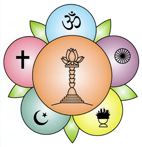
Die dritte Blume, die dem Herrn lieb ist, ist die Blume des Mitgefühls (daya) gegenüber allen Lebewesen. Die Bhagavad Gita sagt: „Hasse niemanden (adveshta sarva bhutanam).“ Lebt in Freundschaft mit allen, aber habt nicht zu viele Verbindungen zu den Menschen. Die vierte Blume ist die Blume der Dudsamkeit (kshama), die sehr speziell und bedeutsam ist. Die Pandavas litten sehr durch die Hände der Kauravas, aber Dharmaraja verlor nie die Duldsamkeit, nicht einmal als Draupadi von den Kauravas gedemütigt wurde. Es war die Tugend der Dudsamkeit, welche die Pandavas beschützte und zu einem Ideal für den Rest der Welt machte. Diese Blume der Dudsamkeit ist dem Herrn sehr lieb. Gott wird mit euch zufrieden sein und euch nur dann seinen Segen schenken, wenn ihr ihm die „Blumen“ darbringt, die ihm lieb sind. Durch das Darbringen von Blumen, die verblassen und verwelken, entsteht kein Nutzen. Die immer blühenden Blumen sind Gewaltlosigkeit, Sinnesbeherrschung, Mitgefühl und Nachsicht!
Sri Sathya Sai, 22. August 2000
The third flower that is dear to the Lord is the flower of compassion (daya) towards all living creatures. Bhagavad Gita says, ‘Adveshta Sarva Bhutaanam – Do not hate anybody.’ Live in amity with everyone, but do not have too much connection with people. The fourth flower is the flower of forbearance (kshama) which is very special and significant. Pandavas suffered a lot at the hands of the Kauravas, but never did Dharmaraja lose forbearance. Not even when Droupadi was being humiliated by the Kauravas. It was the virtue of forbearance that protected the Pandavas and made them an ideal to the rest of the world. This flower of forbearance is very dear to the Lord. God will be pleased with you and confer boons on you only when you offer Him the ‘flowers’ which are dear to Him. No benefit accrues from offering the flowers, which fade away and decay. The flowers which are ever-blooming are nonviolence, sense control, compassion and forbearance!
– Divine Discourse, Aug 22, 2000.
